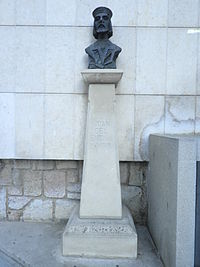Juan del Encina
| Juan del Encina | |
|---|---|

Bust of Juan del Enzina in León
|
|
| Born | July 12, 1468 possibly Fermoselle, Encina de San Silvestre or La Encina, Castile |
| Died | 1529 (aged 60–61) Toledo, Spain |
| Occupation | Playwright, poet, musician |
| Nationality | Castilian, Spanish |
| Alma mater | University of Salamanca |
| Subject | Religion |
| Literary movement |
Renaissance humanism Spanish Renaissance |
| Notable works | Cancionero, Égloga de Plácida y Vitoriano |
Juan del Enzina – the spelling he used – or Juan del Encina – modern Spanish spelling – (born July 12, 1468 – died late 1529 or early 1530) was a composer, poet and playwright, often called the founder, along with Gil Vicente, of Spanish drama. His name at birth was Juan de Fermoselle.
He was born in 1468 near Salamanca, probably at Encina de San Silvestre, one of at least 7 known children of Juan de Fermoselle, a shoemaker, and his wife. He was of Jewish converso descent. After leaving Salamanca University sometime in 1492 he became a member of the household of Don Fadrique de Toledo, the second Duke of Alba, although some sources believe that he did not work for the Duke of Alba until 1495. A plausible argument is that his first post was as a Corregidor in northern Spain.
Fermoselle was a Chaplain at the Salamanca Cathedral in the early 1490s. It was here that he changed his name from Juan de Fermoselle to Juan del Enzina, or Encina (meaning holm oak) during his stay as Chaplain. He was later forced to resign as Chaplain because he was not ordained.
In 1492 the poet entertained his patron with a dramatic piece, the Triunfo de la fama, written to commemorate the fall of Granada. In 1496 he published his Cancionero, a collection of dramatic and lyrical poems. He then applied for the cantor post at Salamanca Cathedral, but the position was divided among three singers, including his rival Lucas Fernandez.
While working for the Duke of Alba, Encina was the program director, along with Lucas Fernandez. Here Encina wrote pastoral eclogues, the foundation of Spanish secular drama. Encina's plays are predominantly based on shepherds and unrequited love.
Encina was ambitious, looking to be promoted based on preferment, so around 1500 he relocated to Rome, where he apparently served in the musical establishments of several cardinals or noblemen. Encina was appointed to the Archdiaconate of Malaga Cathedral by Julius II in 1508.
In 1518 he resigned from position at Malaga for a simple benefice at Moron, and the following year he went to Jerusalem, where he sang his first mass. He also wrote about the events during his pilgrimage to Jerusalem in Tribagia o Via Sacra de Hierusalem. In 1509 he had held a lay canonry at Málaga; in 1519 he was appointed by Leon for the priorship of Leon Cathedral. His last job was recorded as being in Leon, where he is thought to have died towards the end of 1529.
...
Wikipedia
